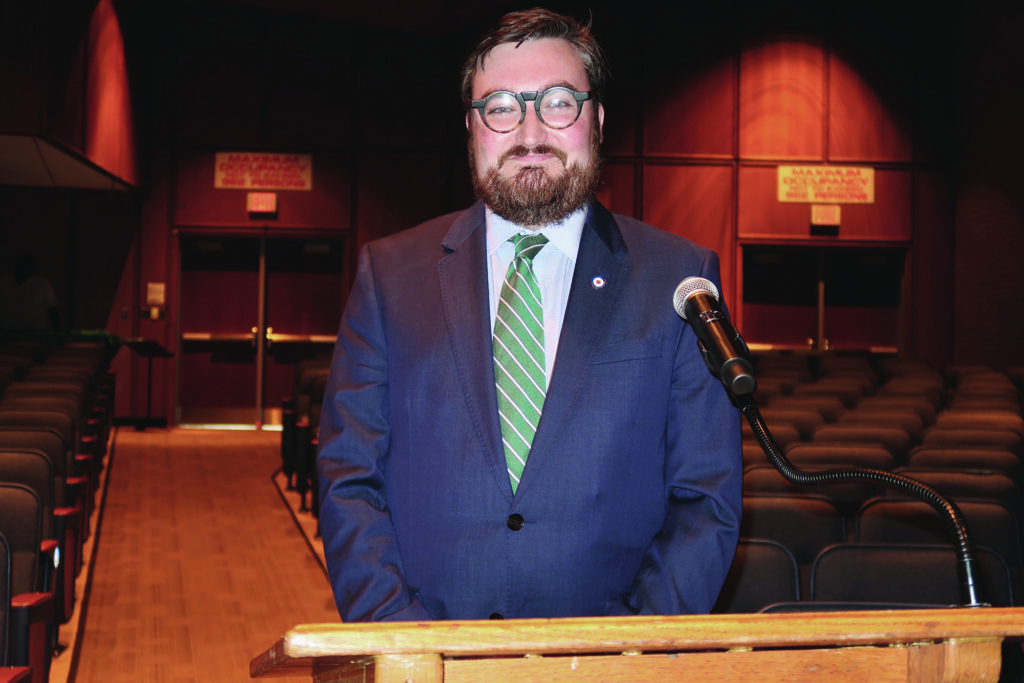Ecological Culture Initiative hosts backyard composting course, encourages communities to reduce food waste

Anthony Romano hopes East Enders band together to stop letting food waste go to waste.
A handful of environmentally conscious North and South Fork residents attended the Ecological Culture Initiative’s backyard composting course Friday evening at the East End Food Market in Riverhead. Mr. Romano, ECI’s treasurer and resource director, hosted discussion of the process local residents and business owners can follow to transform food waste and wood scraps into what he calls “black gold” — nutrient-rich compost that enhances soil quality.
Anyone looking to compost in their backyard needs three things: a 3-by-3-foot plot of land enclosed on three sides by wood pallets or fencing, nitrogen-rich food scraps and grass clippings and carbon-rich offerings such as wood shavings, newspapers and autumn leaves.
Environmental initiatives like backyard composting are critical in ecologically sensitive area like the North Fork — where residents not only hope to be self-sufficient, but share environmental concerns of all magnitudes, from wariness of chemicals in supermarket produce and drinking water, to rising sea levels and the question of what to do with waste. With the looming closure of the Brookhaven landfill next year, municipal waste from Riverhead and construction and demolition debris from Southold will have to be shipped elsewhere.
“They can take all of these local resources that are going into dumpsters and going into the waste stream and they can make a local product that’s easy, doesn’t attract rodents, doesn’t smell bad,” Mr. Romano explained. “They can create the solution to the problem of our dump closing.”
Mr. Romano covered best practices for hot composting, a faster method of composting in which the composter maintains a balance of one part nitrogen with three parts carbon. This means the pile needs a whopping amount of maple shavings, leaves, asparagus stems and hunks of tree bark, in addition to the banana peels, cut up vegetable scraps and coffee grounds. This balance keeps the pile’s temperature between 100 and 130 degrees Fahrenheit and produces ready-to-use compost in about three months.
He also noted that people with no interest in home gardening could still compost and simply let the results lie on the earth. This activity still reduces food scraps in the waste stream.
Calverton resident Christine Grossman, who has been interested in composting for many years, said she is still seeking best practices to bolster her soil quality. Starting out, she just placed kitchen scraps in her garden, hoping the nutrients would help her kale, tomatoes, squash, beans , perennials and wildflowers. More recently, she tried a compost tumbler, which stores and mixes the compost ingredients that break down into usable “black gold.” Now, she is ready for Mr. Romano’s traditional compost pile method to keep her personal backyard produce bountiful.
“It’s a great thing to take what you have and put it back into the earth,” Ms. Grossman said. “Essentially you’re making better soil for yourself so I think it’s a wonderful thing to do.”
“I’m very much into making stews and soups and so if you need something, or even sautéeing, you just go out to your garden and pick it,” she added. “You know what you have is organic, you haven’t sprayed it in any way with chemicals.”
Mr. Romano’s relationship with the environment sprouted at his childhood home in Shirley, where his family “had a huge garden and that is where I got my fingers dirty.”
“That is where I ate out of the garden,” he said. “That is where I learned how to cook.”
Today, he leads ECI’s community composting initiative at the group’s garden at St. Joseph Villa in Hampton Bays. Over a three-month period, participants drop off their food waste at the garden, or they can have their scraps picked up by ECI volunteers for an additional charge. At the end of the program, participants receive the “black gold” they helped produce to strengthen their homegrown crops.
Romano encourages those who take his backyard composting courses to make change far beyond their own yards and launch a similar community-oriented composting program.
“We can do a composting system that just involves the people on one block,” he explained. “Or we can do it so that they then have a one-mile radius of people that participate; it’s so wide open.”
Anyone interested in learning more, volunteering or donating to ECI can email [email protected], call 631-268-4166 or visit eciny.org.








